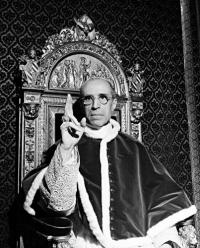By Rossella Tercatin*, July 19, 2012
A furious debate has broken out in Italy after the decision of Israel’s Holocaust Museum, Yad Vashem, to change the captions under the museum’s display on the wartime pope, Pius XII.
On October 16, 1943, over 1,000 members of Rome’s Jewish community were taken to death camps, without a word of condemnation from the pope, who lived in the Vatican, only streets away from the Jewish ghetto. Pius XII’s wartime role has been the subject of considerable criticism, made more complex because of the continued refusal of the Vatican to open its archives so that scholars can establish definitively what the pope did or did not do.
But now Yad Vashem has altered the captions on its wartime Vatican display to reflect the latest academic thinking — and has strongly rebutted suggestions that it did so due to Vatican pressure.
Its spokesman said: “Recently, following the recommendation of the Yad Vashem International Institute for Holocaust Research, the panel regarding the wartime activities of the Vatican and Pope Pius XII has been updated. This is to reflect research that has been done in recent years, and presents a more complex picture than previously presented”. It added pointedly: “Yad Vashem looks forward to the day when the Vatican archives will be open to researchers so that a clearer understanding of the events can be arrived at.”
But Riccardo Di Segni, chief rabbi of Rome, expressed his indignation. He said: “It is hard to believe that the new wording is not the result of pressure from the Vatican. It is not acceptable that bureaucrats, diplomats, and maybe even politicians, deem the Vatican’s demands more important than our painful memories”.
Supporting the Yad Vashem scholars, the distinguished Jewish Italian historian Anna Foa said: “I do not think that the new panel has softened its account of Pius XII’s role. In my view, the update acknowledges the fact that we are still in the middle of an open debate.”
The outgoing Israeli ambassador to the Vatican, Mordechai Lewy, during his last press conference before returning to Israel, denied his involvement in the Yad Vashem decision.
But these explanations have not persuaded Rome’s chief rabbi. He told Yad Vashem: “If you have documents, let other academics and other people know them. Please try to understand the impact of your decision on our community. They are not historians, they suffered because of history. They can change their opinion, but they need facts and documents”.
* Rossella Tercatin is a reporter for Pagine Ebraiche, the magazine of Italian Jewry

